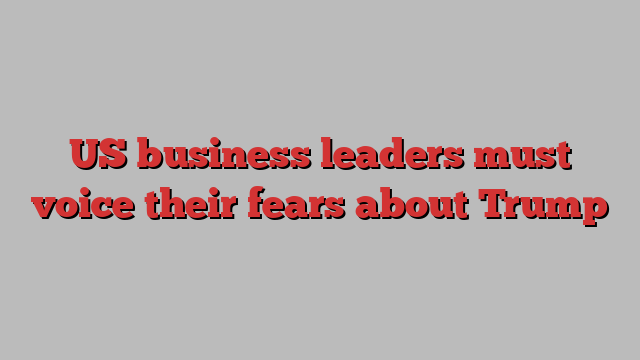
Unlock the US Election Countdown newsletter for free
The stories that matter on money and politics in the race for the White House
The writer is an associate fellow at Chatham House and former senior vice-president at Calvert Investments
Business Roundtable — the top table of corporate America’s chief executives — recently posted the statement: Voting is the Bedrock of our Democracy. It rightly urges Americans to “respect the processes set out in federal and state laws for electoral determinations and an orderly transition”. The risk of Donald Trump refusing to accept election results, threats of violence at the polls and pre-emptive Republican legal challenges are all alarming.
Statements by business organisations can be powerful. Before and after the 2020 US election, calls for the peaceful transfer of power were prescient given the January 6 2021 Capitol riots. But this new statement is anaemic. American constitutional democracy and leadership in the international community are the bedrock of US business and the global economy. Those foundations now face a grave threat.
Business minds should focus not only on the conduct of the election but on its outcome. A second Trump term could have catastrophic implications for corporate America in the intertwined political, economic and geopolitical arenas.
Some former chief executives have been blunt about these risks. In July, former Merck CEO Kenneth Frazier warned of Trump’s threat to the rule of law, US economy and democracy. In August, former American Express CEO Ken Chenault endorsed the Democratic candidate Kamala Harris and emphasised that “business requires stability”. This is in contrast to the chaotic unpredictability of another Trump term. Eighteen other former CEOs have also endorsed Harris.
Yet most other business leaders fear to speak openly amid worries about political retribution or the demonisation of individual companies.
It is understandable that the current CEOs of major public companies might hesitate to endorse a presidential candidate. But that does not mean they cannot speak up about the risks of a second Trump presidency.
These are ominous — from threats of 60 per cent tariffs on Chinese imports to the potential negative impact on European security as Trump claims he can settle the Russia-Ukraine war in “24 hours”. His recent references to political opponents as the “enemy from within” and to January 6 as a “day of love” should also persuade corporate America that the outcome of this election is far more important than party, ideology or policy.
The BRT, along with the National Association of Manufacturers and the US Chamber of Commerce, should directly address the stakes for the US and global economy in this election before Tuesday. These include the sanctity of the rule of law, the vitality of American constitutional democracy, the constancy of US leadership in the international community and the credibility of commitments to Nato and Asia-Pacific allies.
Defending these pillars of stability and prosperity is the corporate responsibility test of the century for American business. The risks of inaction outweigh the risks of action.
In Europe, lessons have been drawn from the complacency and complicity of German business in the 1930s. Major German business leaders have embraced their responsibility to address the risks posed by the far right AfD to democracy and economy. In January, the CEO of Deutsche Bank warned that the Alternative for Germany’s rise imperils “the democratic values and structures” essential to investment.
In September, the CEO of chemical company Evonik underlined the threat in Germany “to liberalism, tolerance, democracy, the rule of law and freedom of opinion” that “endangers everything from human rights to foreign investment”.
Their example merits reflection and action by US business leaders for whom discretion — not conviction — has seemed the better part of valour. The country’s fateful election is almost upon us: it is their responsibility to overcome fear and speak the truth.